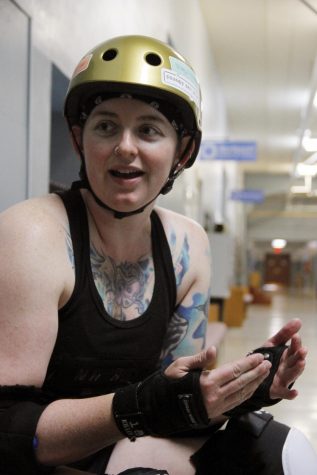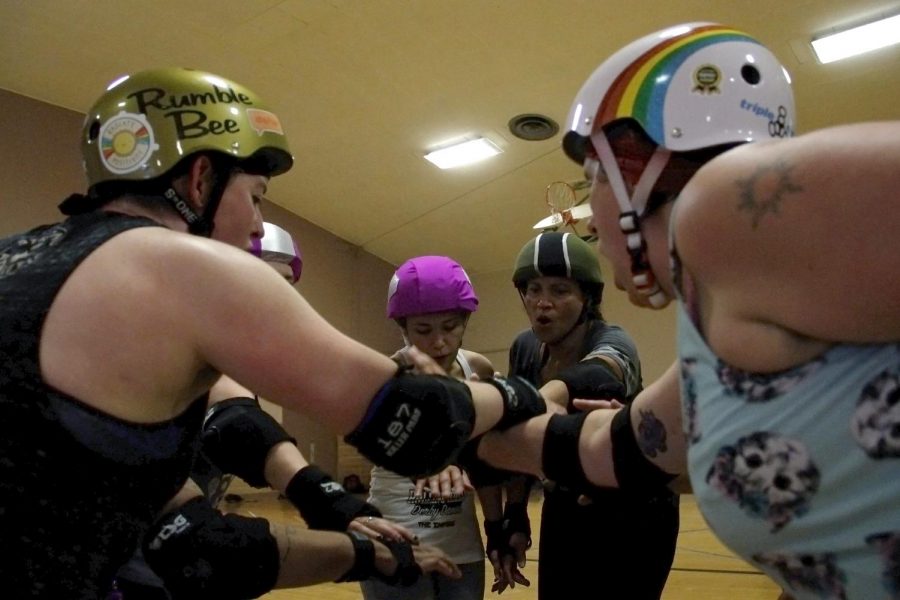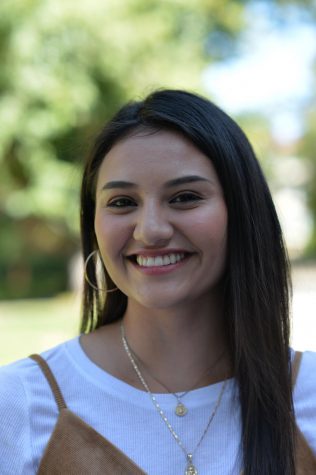‘We’re pushing each other to be strong and powerful’
Rolling Hills Derby Dames provides an open community among diverse athletes
JESSICA HARJA | THE DAILY EVERGREEN
The Rolling Hills Derby Dames gear up Monday evening at Gladish Community and Cultural Center for the upcoming double header this weekend.
June 13, 2019
Hello Cheriese leans forward in her roller skates, bending at the knee as she builds momentum and attempts to speed past a group of women moving to block her. She pulls her arms in and leans further down, skirting past the blockade of bodies to score points and make another round.
Cheriese Strole, whose derby name is Hello Cheriese, has been playing with the Rolling Hills Derby Dames for about a year.
The 26-year-old began playing derby at a military base about three years ago when her husband was in the U.S. Army.
“[We] kinda just picked up and moved to Georgia so I was like ‘I don’t know what to do here,’ ” she said.
Strole said a friend invited her to play roller derby, and at the time she thought she wouldn’t be able to because she didn’t know how to skate.
“The first time I put on skates I was like, I don’t know how to roll on these things, this is so brand new,” Strole said. “The last time I was on rollerblades it was at a birthday party, and I nearly broke my wrists.”
When Strole moved to the Palouse in 2017, she said she immediately considered the derby teams in the region.
“It’s a completely serious sport because we really do want to win, it’s very competitive,” she said. “I find that a lot of women, they’re all really competitive but they don’t get to show it in their everyday lives.”
Head coach Morgan Sherwood has been with the Dames for a few months but has helped coach other leagues since 2015. Roller derby is a full contact and competitive sport, but there is a strategic element to the game for sure, he said.
“I’ve been skating for about eight years but I decided to move to coaching and not skate anymore, I’m transitioning [feminine to masculine identity],” Sherwood said.
His derby name is Heck No Techno, and as a coach, he loves helping people realize potential they didn’t know they had, he said.
Roller derby is an open gender sport and is open to transgender and non-binary individuals, said 32-year-old Rachel Olsson.
The rules that govern the sport allow transgender and non-binary individuals to participate, which is huge because many sports are gender exclusive, she said.
“The community is supportive [and] incredible,” Olsson said. “Everywhere else you go, people are cutting each other down and being shitty to each other and especially in competitive environments.”
Olsson, who goes by Rumble Bee, has been playing with the Dames since the beginning of January but has played derby for about four years. She is a graduate student in the entomology department at WSU.
“It was a really good way to kind of combine getting to know people and joining the community but also getting some exercise and doing something competitive,” she said.
Olsson said team members come from all walks of life. There are moms, nurses, doctors, paramedics, lawyers, undergraduate and graduate students. Team members ages range from 19 to mid-50s.

Rachel Olsson, a blocker and new skating coach for the Rolling Hills Derby Dames, describes the strong community she has discovered with the contact sport on Sunday at the Gladish Community and Cultural Center.
“We’re pushing each other to be strong and powerful, and not just beating each other down,” she said. “We do that. We knock each other down, but we pick each other up.”
Olsson said the coaches are skilled in encouraging improvement in the physical aspects of the sport, as well as boosting people’s confidence.
However, she said people have many misconceptions about roller derby.
“We’re not punching each other in the face, we’re not throwing elbows, there’s a lot of things that can get you sent to the penalty box,” Olsson said.
In roller derby, Sherwood said there are five players from each team on the derby track. There are three blockers, one pivot and one jammer.
The jammer looks to score points while blockers attempt to block the jammer. A pivot plays the role of a blocker but can become a jammer if the jammer is tired or if they would deem this a strategic play, he said.
Teams play for about an hour, with a break after the first 30 minutes, Sherwood said.
Bailey Page, whose derby name is Rock ‘Em Sock ‘Em, said she has been playing with the Dames since September 2017. Page, 22, is a WSU geology major.
Page said she joined because she wanted to get in better physical shape and make some friends who had a common interest in derby.
“I know all the girls in there have my back no matter what … I think I really needed that,” she said. “It came at the right time and I just fell in love with the sport.”
Olsson said most team members practice around six hours a week in the Gladish Community and Cultural Center. Several members also exercise outside of practices.
Everyone has their own individual ritual to prepare for a bout, she said.
“I’m a pretty big believer in mindfulness,” Olsson said. “I taught yoga for 10 years so I do a fair amount of meditating and visualization to prepare.”
She said she also lifts weights and does CrossFit to minimize injuries while playing derby.
In preparation for a bout, Strole said she likes to relax with her dog, have a cup of coffee, then go for a run at the gym. After that, she will usually spend time with her husband, drink some pre-workout and head to the track.
Page said she begins prepping a day before by making sure she is well hydrated and eating well. She will start getting ready about three hours before a bout.
“Bout makeup is a huge thing too, depending on who we’re bouting and what the theme is,” she said. “It is fun. It’s like a ceremony. To put it on, you take the time and think about what you’re doing.”
Olsson said roller derby is a team sport and every member can put aside any differences they might have and work together.
“We’re perceived as being television wrestling and that’s not the case, this is a sport, we are athletes,” she said. “We train, we take care of our bodies, we practice mental strength just as much as physical strength.”










